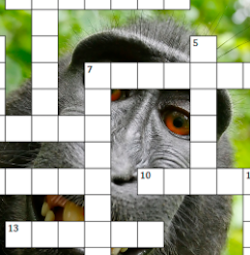 My dad’s voice comes from the other room, asking “document granting exclusive right to publish?”, adding that “it’s in nine letters”. It turns out that this is the clue for nineteen down in today’s today’s Irish Times simplex crossword. It also turns out that the answer is “copyright”. I had spent at least a quarter of an hour assuring him that the answer couldn’t possibly be “copyright”, because copyright automatically vests if the work is original, and no additional grant of copyright, or document granting an exclusive right to publish, is necessary. As the Patents Office explains “the act of creating a work also creates the copyright, which then subsists in the physical expression of the work”. To the extent that there is anywhere a document granting a right to publish, the closest is an imprimatur, but that didn’t fit. And somebody who holds a copyright in a work can license its use to someone else, and can even licence its exclusive use to someone else, but “licence” didn’t fit either (and anyway, licences are permissions to do lots of things, like drive a car, use a television, or keep a dog; they are not confined to publications or copyrights; and they don’t have to be written documents). When the letters from the interlocking clues gave C_P_R_G_T, I had to concede that the answer was indeed “copyright”, but I continued to insist that the combination of clue and answer is just plain wrong.
My dad’s voice comes from the other room, asking “document granting exclusive right to publish?”, adding that “it’s in nine letters”. It turns out that this is the clue for nineteen down in today’s today’s Irish Times simplex crossword. It also turns out that the answer is “copyright”. I had spent at least a quarter of an hour assuring him that the answer couldn’t possibly be “copyright”, because copyright automatically vests if the work is original, and no additional grant of copyright, or document granting an exclusive right to publish, is necessary. As the Patents Office explains “the act of creating a work also creates the copyright, which then subsists in the physical expression of the work”. To the extent that there is anywhere a document granting a right to publish, the closest is an imprimatur, but that didn’t fit. And somebody who holds a copyright in a work can license its use to someone else, and can even licence its exclusive use to someone else, but “licence” didn’t fit either (and anyway, licences are permissions to do lots of things, like drive a car, use a television, or keep a dog; they are not confined to publications or copyrights; and they don’t have to be written documents). When the letters from the interlocking clues gave C_P_R_G_T, I had to concede that the answer was indeed “copyright”, but I continued to insist that the combination of clue and answer is just plain wrong.
When Dad is doing crosswords, we often have debates about the accuracy of crosswords clues and answers, and dictionaries and online searches are deployed to dispute the rigour of a clue or the precision of an answer. It’s all part of the fun of doing crosswords. But, in my view, this combination of clue and answer goes well beyond the bounds of friendly disagreement. It is quite simply false to say that a “copyright” is a “document granting exclusive right to publish”. A quick online search told me that “document granting exclusive right to publish” is used pretty regularly as a crossword clue with “copyright” as the answer. So, it’s wrong a lot. But that makes things worse. Lots of crossword setters use this clue, and lots and lots of unsuspecting crossword solvers are being misled as a consequence. This is a very great shame.
Or maybe I’m just looking for an excuse not to get back to the exam scripts which are not being corrected as I type.